
Hera's Sorrow - Zeus And His Lovers (Not An Update)
Everyone knows that Zeus was the king of God's. We all know, by now, that Hera was married to Zeus. Zeus had four marriages in total. But, does marriage ensure love, security and everything about the need to be loved?
I don't think so.
Marriages take work, commitment, and love, marriage also need respect to be truly happy and successful. Hera married Zeus out of love but the whole story is different. They are perfect example of marriage but, are they?
Love didn't go for Zeus. He lost interest in Hera after marriage. One of the popular reasons for loss of love is going after a short term need. If a person wanted to get into a relationship to end loneliness, to increase their self esteem or to get some approval then certainly after achieving that goal the person would become less interested in the relationship. Maybe that's what happened here... I am not sure...
Let's see the journey of Zeus and his lovers and try to feel Hera's sorrow.
Europa
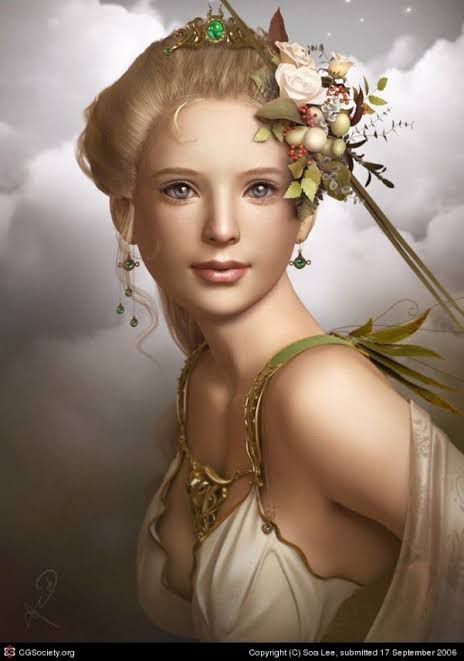
Europa, in Greek mythology is the daughter either of Phoenix or of Agenor, king of Phoenicia. The beauty of her's attracted the love of Zeus. One day, she, with her friends went off gathering flowers by the sea. Zeus noticed them, fell in love with Europa and changed himself into a white bull that smelled of flowers. He laid down in front of her and she slid onto its back. Instantly, the bull charged off, plunging into the sea, and began to swim rapidly away from the shore. Europa saw that a whole procession had joined them: Nereids riding dolphins, Triton blowing his horn, and even Poseidon, the ruler of the waters. From this, she realized that the bull must be a god and she pleaded to pity her. Zeus spoke to her and explained his love. He took her to Crete, where he had been raised, and promised her that she would bear him many famous sons – among them was also the infamous Minos.
Io
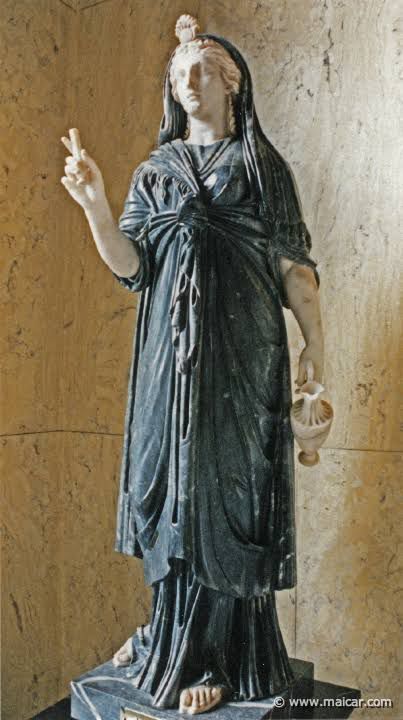
Io was one of the mortal lovers. She was a priestess of the Goddess Hera in Argos. Zeus noticed Io and began to desire her. She initially rejected Zeus’ advances, until her father threw her out of his house on the advice of oracles. Then Zeus enveloped himself in a dark cloud in order to seduce her. He, then, seduced her. According to stories, Zeus then turned Io into a heifer in order to hide her from his wife. But the deception failed, and Hera begged Zeus to give her the heifer as a present, which, having no reason to refuse, he did. Hera then sent Argus Panoptes, who had 100 eyes, to watch Io and prevent Zeus from visiting her, and so Zeus sent Hermes to distract and eventually slay Argus. According to Ovid, he did so by first lulling him to sleep by playing the panpipes and telling stories. Zeus freed Io, still in the form of a heifer.
In order to exact her revenge, Hera sent a gadfly to sting Io continuously, driving her to wander the world without rest. Finally she escaped to Egypt, where she was restored to human form by Zeus. There she gave birth to Zeus’ children.
Danae

Danae was a daughter of King Acrisius. At the time she was childless and the King asked the oracle of Delphi if this would change. The oracle announced to him that he would never have a son, but his daughter would, and that he would be killed by his daughter’s son. So, Acrisius shut poor Danae up in a bronze chamber who was buried in this tomb, never to see the light again. However, Zeus desired her, and came to her in the form of golden rain which streamed in through the roof of the subterranean chamber and down into her womb. Soon after, their child Perseus was born, and of course couple of years later, he killed King Arcisius – accidentally.
Semele
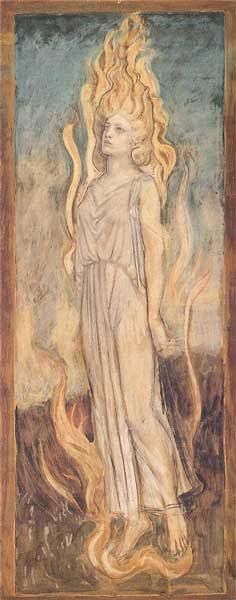
Semele was a priestess of Zeus. Zeus one day, saw her as she slaughtered a bull at his altar and afterwards swam in the river Asopus to cleanse herself of the blood. Flying over the scene in the guise of an eagle, Zeus fell in love with Semele and repeatedly visited her secretly.
Hera as usual, discovered his affair with Semele when she later became pregnant. Appearing as a nurse, Hera befriended Semele, who confided in her that her lover was actually Zeus. Hera pretended not to believe her, and planted seeds of doubt in Semele's mind. Curious, Semele asked Zeus to grant her a boon. Zeus, eager to please his beloved, promised on the River Styx to grant her anything she wanted. She then demanded that Zeus reveal himself in all his glory as proof of his divinity. Though Zeus begged her not to ask this, she persisted and he was forced by his oath to comply. Zeus tried to spare her by showing her the smallest of his bolts and the sparsest thunderstorm clouds he could find. Mortals, however, cannot look upon the gods without incinerating, and she perished, consumed in lightning-ignited flame.
Zeus rescued the fetal Dionysus, however, by sewing him into his thigh. A few months later, Dionysus was born. This leads to his being called "the twice-born". When he grew up, Dionysus rescued his mother from Hades, and she became a goddess on Mount Olympus, with the new name Thyone, presiding over the frenzy inspired by her son Dionysus.
Ganymede
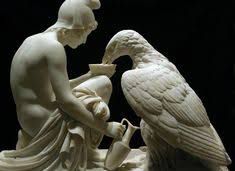
Ganymede was abducted by Zeus from Mount Ida near Troy in Phrygia, because of his unusual beauty. He was the son of king of Troy. Ganymede had been tending sheep, a rustic or humble pursuit characteristic of a hero's boyhood before his privileged status is revealed. Zeus either summoned an eagle or turned into an eagle himself to transport the youth to Mount Olympus.
Nemesis
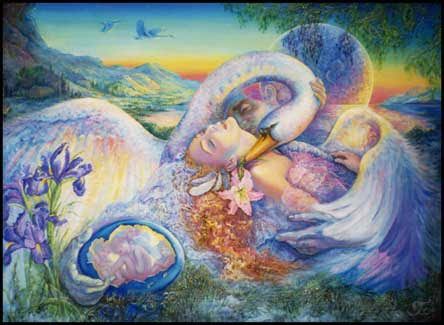
In Greek mythology, Nemesis was the Goddess of vengeful fate, rightful retribution, or revenge as represented in her name which has a rough translation of “to give what is due” from Greek language. She was later also known as Rhamnousia and Rhamnusia. She has enormous wings and travels in a chariot drawn by Griffins.
She was persuaded by Zeus. To avoid him, she transformed herself in a goose. Zeus, transformed himself into a swan to catch her. He caught and impregnated her. Nemesis laid two eggs then, each of which contained a set of twins.
Callisto
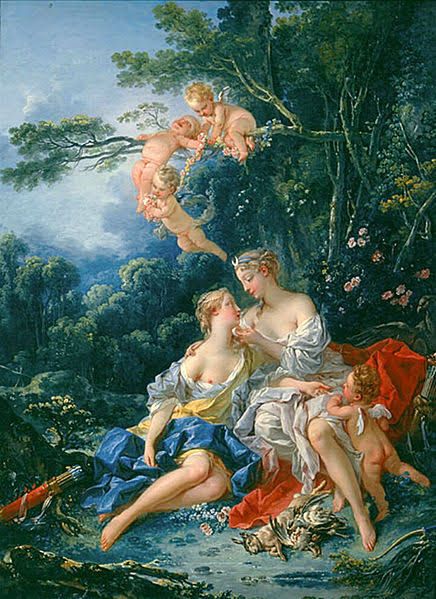
As a follower of Artemis, Callisto, who was the daughter of Lycaon, king of Arcadia, took a vow to remain a virgin, as did all the nymphs of Artemis.
According to Hesiod, she was seduced by Zeus. Zeus transformed himself into the figure of Artemis to lure Callisto and rape her. She became pregnant and when this was eventually discovered, she was expelled from Artemis's group, after which a furious Hera, transformed her into a bear. Later, just as she was about to be killed by her son when he was hunting, she was set among the stars as Ursa Major ("the Great Bear"). She was the bear-mother of the Arcadians, through her son Arcas by Zeus.
The fourth Galilean moon of Jupiter and a main belt asteroid are named after Callisto.
Dione

Dione was the Titan goddess in Greek mythology, most probably a daughter of Oceanus and Tethys and thus, an Oceanid. According to some sources, she was the first wife of Zeus. She was an oracle and was worshipped alongside Zeus at the earliest Oracle in Greece that was located at Dodona. She is older than Hera.
Eurynome

She was a Titan goddess in Greek mythology, daughter of the Titans Oceanus and Tethys, hence an Oceanid. She was the third wife of Zeus, with whom she had the three Charites, goddesses of grace. When Hephaestus was thrown off Mount Olympus by his mother Hera for being crippled, Eurynome and Thetis caught him and raised him. Eurynome may also have been a goddess of pasturelands.
She was also often linked to another Eurynome, who was an early Queen of the Titans alongside her husband, Ophion. This couple fought against Cronus and Rhea and lost the throne to them.
Demeter

She, Demeter, in Greek religion, daughter of the deities Cronus and Rhea, sister and consort of Zeus (the king of the gods), and goddess of agriculture. In addition to Zeus, Demeter had a lover, Iasion (a Cretan). I don't know much but, she is Persephone's mother.
Persephone

Persephone is the Greek goddess of springtime and maidenhood, and is the queen of the Underworld. She is married to Hades who is also her uncle. Her Roman name is Proserpine.
Persephone was born to Zeus and harvest -goddess. Zeus, however, did not care for Persephone, and left them both. Demeter would then raise Persephone alone.
As soon as Persephone matured, she gained many suitors. She, however, remained a maiden. One morning, she was out picking flowers when Hades burst through the Earth, riding a golden chariot pulled by black horses. He had seen her earlier that day and had fallen in love with her. He grabbed her by the wrist and waist, took into the chariot, and down to the Underworld.
Persephone spent a year there. In this time period, during the first nine days her mother, Demeter, was distraught and searched for her. Hekate saw her one of the nine days and told Demeter. Demeter became intensely sad and stopped caring about nature and the Earth. This caused nature to die, and the first winter to occur.
Persephone longed for a friend, and hated Hades. However, he soon grew on her, and experienced true freedom. Soon, Hekate came down and befriended her, and Hades grew happy for Persephone.
Zeus then ordered Hades to return Persephone, but Hades sent a wonderful gift to Zeus. Persephone also ate six pomegranates, which cursed her to stay there for six months. Zeus was taken by the gift but was torn between it and nature. He, Demeter, and Hades came to an agreement: Persephone would stay three quarters of the year in Hades and one quarter of the year on Earth/Olympus with Demeter.
Most of the gods wanted to make her their bride. Hermes offered his rod as gift, Apollo produced his melodious harp as a marriage gift. Ares brought spear and cuirass for the wedding and shield as bride gift. Hephaestus bring necklace of many colours as a gift. Even Persephone beauty could not escaped the allseeing eyes of Zeus.
Demeter, mother of Persephone, rejected all gifts sent to Persephone. Demeter, worried about her daughter, so she went to the house of Astraios, the god of prophecy or more specifically astrology. Astraios told Demeter to guard her daughter against a robber-bridegroom and before marriage a false and secret bedfellow will come unforeseen, a half monster and cunning mind.
Demeter hid her gorgeous young daughter, in a cave deep under ground and two dragons were placed to gard the cave. Zeus was bewitched by Persephone beauty and somehow found out the cave where Demeter had hid her. Zeus transformed himself into a dragon, lulled the two dragons into sleep, who were guarding the cave, and managed to get inside the cave. Where he seduced, his own daughter, Persephone's virgin body in form of dragon. With their union, Zagreus was born.
Later when Persephone became queen of underworld, she was again seduced by Zeus but this time disguised as her husband, Hades. Melinoe was said to be born from this union.
Thalia
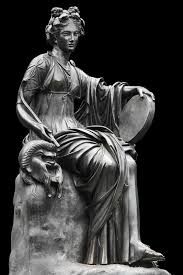
We probably know her from Percy Jackson. But, she was one of the three Charites (Graces) in Greek mythology, the other two being her sisters Aglaea and Euphrosyne. Their father was Zeus, and their mother was either the Oceanid Eurynome, or Eunomia, the goddess of lawful order. Thalia was the goddess of festivity.
I don't know much about the love story, but, Zeus turned her to a pine tree to save her life.
Mnemosyne

Mnemosyne, in Greek mythology, the goddess of memory. A Titaness, she was the daughter of Uranus (Heaven) and Gaea (Earth).
In Hesiod's Theogony, kings and poets receive their powers of authoritative speech from their possession of Mnemosyne and their special relationship with the Muses.
Zeus, in a form of a mortal shepherd, and Mnemosyne slept together for nine consecutive nights, thus conceiving the nine Muses. Mnemosyne also presided over a pool in Hades, counterpart to the river Lethe. Dead souls drank from Lethe so they would not remember their past lives when reincarnated. In Orphism, the initiated were taught to instead drink from the Mnemosyne, the river of memory, which would stop the transmigration of the soul.
Leto
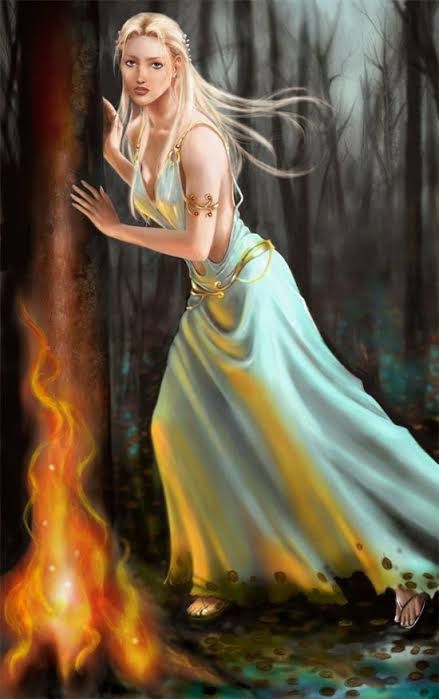
She was a Titan goddess in Greek mythology, daughter of the Titans Coeus and Phoebe. She was an early and favourite lover of Zeus.
Zeus married Hera while Leto was pregnant. While the pregnancy started before the marriage, Hera was still jealous of Leto. For the duration of Leto's pregnancy, Hera created problems. She pushed Leto out of Olympus. As Leto wandered on the earth, no person would let her stay in their home for fear Hera would be offended. On top of that, Hera had the dragon Python chase her. Zeus saved her by sending the North Wind, Boreas, to carry her out to sea. Finally, the desolate, rocky island of Delos, which had nothing to lose, accepted her. The other goddesses gathered there to help Leto during the labour. Hera stayed away and managed to detain Eileithyia, goddess of childbirth, but Iris eventually succeeded in bringing her to the island. Leto first gave birth to Artemis, and after another nine days of labour, to Apollo. Still fleeing from Hera, she went to Lycia. The peasants tried to prevent her from drinking from their well, so she turned them into frogs.
Although Leto's problems continued for a little more, she now had two fast growing children, both of whom became powerful archers, to protect her. Only four days old, Apollo managed to kill Python. Then, the Euboean giant Tityus tried to rape Leto, but was killed by the children. As they grew into their full power, the twins wanted to avenge Leto's honour as well as to protect her safety. Niobe boasted that she was more deserving of adulation then Leto, because she had given birth to seven sons and seven daughters. The twins replied to this by slaying all but one of Niobe's children. As the mother of two powerful gods, Leto returned to Zeus's favour despite Hera's disapproval. After Apollo killed the Cyclopes, Leto was able to persuade Zeus to lighten his punishment. She spent much of her time hunting with Artemis. She sided with the Trojans during the war and helped heal Aeneas from his battle wounds.
Electra
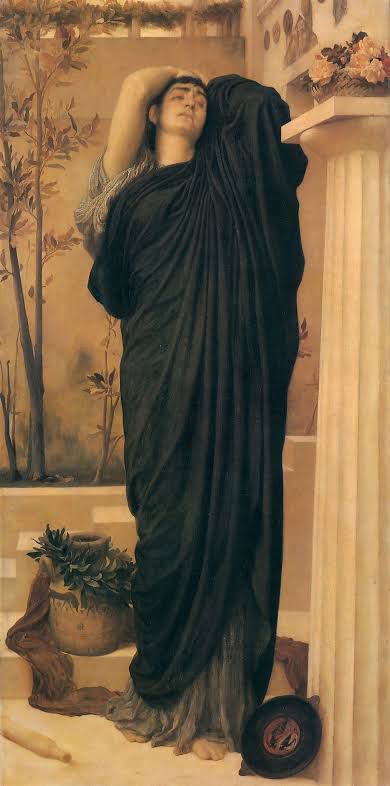
She is the goddess of storm and clouds.
ELEKTRA (Electra) was the Pleiad star-nymph of
Mount Saon on the island of Samothrake (Samothrace) in the north Aegean. She was loved by Zeus and bore him two sons, Dardanos, ancestor of the Trojan royal family, and Iasion, founder of the Samothrakian Mysteries. She was also entrusted with the fostering of Aphrodite's illegitimate daughter Harmonia. Her name is derived from the Greek word êlektron--the substance and the colour amber.
Niobe
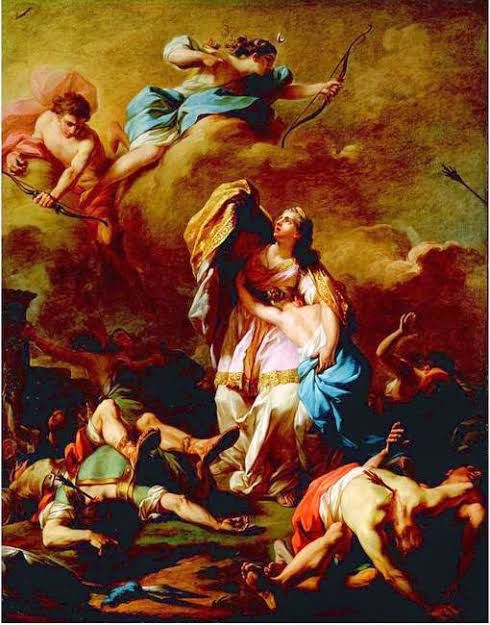
NIOBE, in Greek mythology, daughter of Tantalus and Dione, wife of Amphion, king of Thebes. Proud of her numerous family, six daughters and six sons, she boasted of her superiority to her friend Leto, the mother of only two children, Apollo and Artemis. As a punishment, Apollo slew her sons and Artemis her daughters. Their bodies lay for nine days unburied, for Zeus had changed the people to stone; on the tenth day they were buried by the gods. Out of pity for her grief, the gods changed Niobe herself into a rock on Mount Sipylus in Phrygia, in which form she continued to weep.
Niobe's husband, Amphion was a son of Zeus and Antiope , twin brother to Zethus, a ruler of Thebes.
Taygete

The Greek goddess Taygete (pronounced t-ai-IH-j-eh-t-ee). whose named means long-necked, is one of the seven daughters of Atlas and Pleione. The daughters (Taygete, Maia, Celaeno, Alcyone, Electra, Sterope and Merope) are mountain nymphs also known as the Pleiades. Legends say that Zeus turned the seven sisters into the constellation to protect them from the advances of Orion. Her star in the Pleiades constellation is named Taygeta.
According to mythology, Taygete hid beneath a mountain after she had been taken advantage of by Zeus. Mt. Taygetos now bears her name. Here she gave birth to Lacedaemon who would eventually marry Queen Sparta and found the infamous city of the same name. This makes Taygete one of the ancestors of the royal family of Sparta. Taygete also had another son by Zeus named Eurotas according to some texts.
Antiope
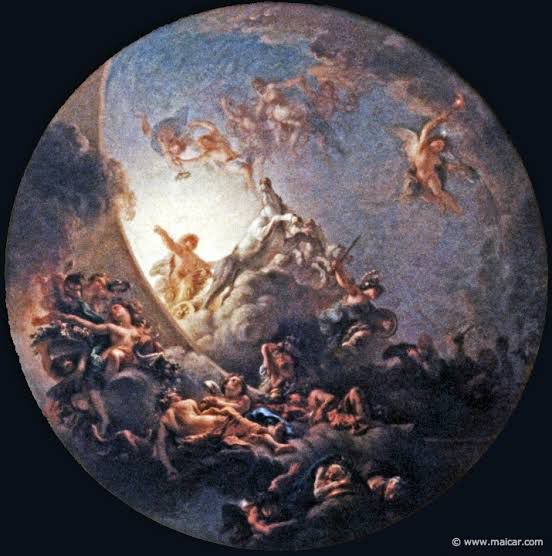
Her beauty attracted Zeus, who, assuming the form of a satyr, took her by force. This is the sole mythic episode in which Zeus is transformed into a satyr. Being pregnant with Zeus’ child Antiope feared the wrath of her father, Nycteus, and fled to Sicyon, where she married Epopeus. After this she was carried off by Epopeus, who was venerated as a hero in Sicyon; he would not give her up till compelled by her uncle Lycus. Lycus pursued Antiope after his brother Nycteus committed suicide because of Antiope’s disgrace.
On the way home she gave birth, in the neighbourhood of Eleutherae on Mount Cithaeron, to the twins Amphion and Zethus, of whom Amphion was the son of the god, and Zethus the son of Epopeus. Both were left to be brought up by herdsmen. At Thebes Antiope now suffered from the persecution of Dirce, the wife of Lycus, but at last escaped towards Eleutherae, and there found shelter, unknowingly, in the house where her two sons were living as herdsmen. This is the situation in Euripides' Antiope, which turns upon the recognition of mother and sons and their rescue of her.
Here she was discovered by Dirce, who had come to celebrate a Bacchic festival; she ordered the two young men to tie Antiope to the horns of a wild bull. They were about to obey, when the old herdsman, who had brought them up, revealed his secret, and they carried out the punishment on Dirce instead, for cruel treatment of Antiope, their mother, who had been treated by Dirce as a slave. In Euripides, the descent of Hermes stops the brothers from putting their uncle to death; Lycus then resigns power in the Cadmeia of Thebes to the twins.
For the treatment of Dirce, it is said, Dionysus, to whose worship she had been devoted, visited Antiope with madness, which caused her to wander restlessly all over Greece until she was cured, and married by Phocus of Tithorca, on Mount Parnassus, where both were buried in one grave.
Amphion became a great singer and musician after Hermes taught him to play and gave him a golden lyre; Zethus was a hunter and herdsman. Amphion and Zethus are said to have established the fortifications of Thebes. For Greeks of the Classical age, the contrast between the lifestyles of the two became the most salient element in the narrative; in Euripides' Antiope the best-recalled scene was where the two brothers in debate contrasted their active and contemplative lives. Together they built and fortified Thebes, huge blocks of stone forming themselves into walls at the sound of Amphion's lyre. Amphion married Niobe, and killed himself after the loss of his wife and children. Zethus married Aedon, or sometimes Thebe. The brothers were buried in one grave.
Alcmene
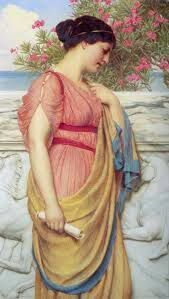
She was the wife of Amphitryon in Greek mythology. The couple had two children, Iphicles and Laonome; however, she was mainly known for being the mother of the demigod hero Heracles by the god Zeus. She was the daughter of Electryon and either Anaxo, Lysidice or Eurydice. Her husband Amphitryon killed her father accidentally, and she followed him to Thebes, where he was purified by the king of the city, Creon. When Amphitryon went on an expedition against the Taphians and Teleboans, Zeus, disguised as Amphitryon, appeared in front of Alcmene and slept with her. The next day, the real Amphitryon returned , only to hear from his wife that she had seen him the night before and slept with him. The seer Tiresias then told them what had happened.
The union of Zeus and Alcmene resulted in her being pregnant to Heracles. When the demigod was about to be born, Zeus announced to all Olympians that a child would be born on that day that would rule all those near him. After Hera made Zeus swear an oath that this would indeed happen, she went to the wife of Sthenelus and forced her to give birth to the baby Eurystheus, even though she was only seven months into her pregnancy. The goddess then prevented Alcmene from giving birth to Heracles until the next day.
Last but not the least,
Hera
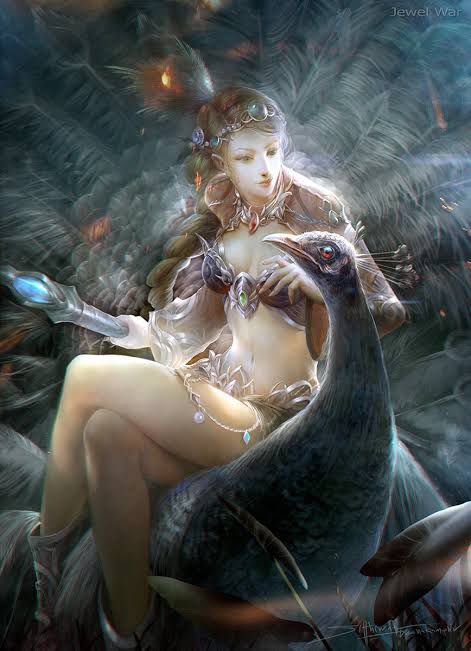
Zeus had many relationships, but it was his sister, Hera, whom he wanted to rule by his side as his wife. Hera, the goddess of marriage and childbirth and the ruler of the sky, said “no” every time Zeus proposed marriage. She was all too aware of Zeus’ past and had no interest in the proposition. Zeus continued to propose for hundreds of years, each time getting a “no” from Hera.
Zeus was persistent and finally came up with a plan that would trick Hera into finally becoming his wife. Zeus was able to transform himself and turned himself into a helpless, rain-soaked bird. Hera found the poor bird and brought it to shelter and took care of it. Zeus turned himself back when Hera took the bird near her breast to hug it. Hera couldn’t help but fall in love with him. She finally agreed to be his wife.
Zeus and Hera’s wedding was the first formal marriage ceremony and was a huge occasion. It took place at the Garden of Hesperides and all of the gods and goddesses attended and brought fancy gifts. There was lots of feasting and the ceremony was the model for modern weddings.
From then on out Zeus and Hera endured a difficult relationship, caused mostly by Zeus becoming involved with and falling in love with other women. He constantly had affairs with goddesses, nymphs, and mortals. Hera became extremely jealous and spent much of her time on Mount Olympus spying on Zeus and plotting revenge if she found out that Zeus spent time with another women.
She had a violent temper and went out of her way to punish the women and their children that Zeus fathered.
When Zeus fell in love with Calisto and fathered her child, Hera turned her into a bear. To save her from being hunted by her own son (part of Hera’s plan), Zeus turned her into a constellation of stars, which became known as “Big Bear”. Their son later became the constellation “Little Bear”. When Zeus tried to disguise his lover Io to hide her from Hera, he turned her into a cow. Hera saw through the ruse and sent a biting fly to repeatedly sting her. Other notable mistresses include Danae; mother of her Perseus, Alcmena; mother of Heracles, Leda; mother of Helen of Troy and Pollux, Europa; mother of King Minos of Crete, and Ganymede; a mortal male and Trojan prince.
In a competition as to who was “the fairest goddess”, Hera was extremely angry that the title went to Aphrodite. Since it was Paris of Troy that chose the winner, Hera’s reaction led to the Trojan War.
Zeus once consulted a wise man when Hera was angry with him and wanted to know how to win back her love. The wise man recommended making a wooden statue of a woman, draping it in cloth, and announcing that she was his bride. Hera removed the drapery and was delighted to see that it was a statue instead of an actual woman.
Metis, the goddess of wisdom, was Zeus’ first wife. According to a prophecy, she would bear two children. The first would be Athena and the second, a son who would be powerful enough to overthrow Zeus.
This made him very anxious. So, he hatched a plan to exterminate Metis. He tricked her, and she allowed him to turn her into a fly. He then swallowed her not realizing that she was already pregnant. As a result, Zeus would later give birth to a powerful daughter – Athena.
When Hera found out that Zeus gave birth to a child without her help, she impregnated herself in retaliation and gave birth to a son named Hephaestus. The boy was severely deformed and nowhere near as alluring as Athena was.
But, what is the worst is that Hera never left his side. Also, Zeus was very jealous of others who tried their luck with Hera.
When Ixion, the king of the Lapiths attempted to seduce Hera, Zeus found out and tricked him into making love to a cloud instead.
Zeus meted out his anger on Ixion by banishing him to the underworld where he would be tied to an ever-spinning wheel of fire for all eternity. Despite Zeus’ wandering eye, Hera remained fiercely loyal to him. While she may have had numerous opportunities to cheat on Zeus, she spent most of her time punishing the objects of his desires.
°°°°°°°°°°°°°°°°°°°°°°°°°°°°°°°°°°°°°°°°°°°°°°
So, this is all I know about. I read about these from Google so, if you find some words or sentences similar, it's because of that. Let me know your thoughts on this....
Also, there are many other lovers but I don't know much about that...
And a massive thanks to Wikipedia and other sites which gave this information to me and the people who are interested in the mythology.
°°°°°°°°°°°°°°°°°°°°°°°°°°°°°°°°°°°°°°°°°°°°°°
Total number of words :- 4333
Bạn đang đọc truyện trên: Truyen247.Pro